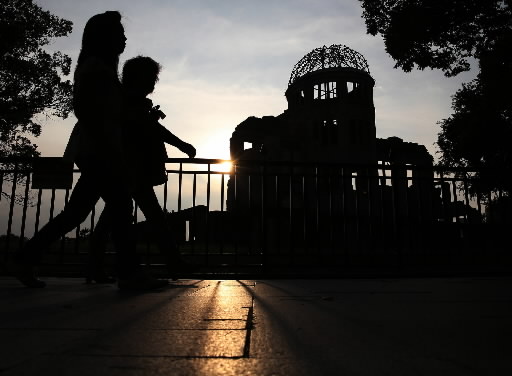Perspective: Let us inherit the wish of the A-bomb survivors
Aug. 6, 2013
by Seiji Shitakubo, Staff Writer
August 6 this year will mark the 68th anniversary of the atomic bombing of Hiroshima. With A-bomb survivors and family members of the victims growing older, it is feared that the memories of the bombing will fade. If we fail to make efforts to hand down their experiences, support for the dangerous notion of condoning nuclear weapons, which survivors call “an absolute evil,” will gain momentum. We must feel a stronger sense of urgency.
The average age of A-bomb survivors in Japan who hold the Atomic Bomb Survivor's Certificate has risen to 78.8 as of the end of March. The total number of survivors declined from the previous year by 9,051 to 201,779. The opportunity for us to listen directly to the survivors or the family members of the victims is dwindling.
For people without firsthand knowledge of the war, it is difficult to imagine how a single atomic bomb could change people’s lives so completely. But imagine the hardships of those affected. When a family suddenly loses its breadwinner, how do those left behind manage to go on?
This summer, the Chugoku Shimbun published a series of articles entitled “Living in Kawauchi, ‘Town of the Atomic Bomb,’” which focused on residents of the town of Kawauchi, now part of Hiroshima’s Asaminami Ward. Under orders from the Japanese government, members of the Kawauchi Volunteer Fighting Corps, 180 or more, were tearing down buildings to create a fire lane in the city center that day. All of them perished in the atomic bombing.
More than 70 women lost their husbands. To provide for their families, they worked hard in the fields. Years later, Masako Nomura, 92, is the only widow among them still with us. “I hate war,” Ms. Nomura says. “Young people must keep the peace.” We have been given a vital mission.
In this year’s Peace Declaration, Hiroshima Mayor Kazumi Matsui urges the policymakers of the world to shift from nuclear saber-rattling to “a system of security based on trust and dialogue.” Is the message of Hiroshima reaching the international community?
In April, the Preparatory Committee for the Nuclear Non-proliferation Treaty (NPT) Review Conference was held in Geneva, Switzerland. About 80 nations endorsed a joint statement which focuses on the humanitarian impact of nuclear weapons and calls for banning the use of these arms.
Japan, though, swam against this new tide for nuclear arms reduction and refused to back the statement. This decision once again exposed Japan’s contradictory stance of calling for the abolition of nuclear weapons while relying on the U.S. nuclear umbrella. Prime Minister Shinzo Abe has even expressed willingness to depend more heavily on the nuclear umbrella and revise Japan’s pacifist constitution.
Hiroshima’s survivors transformed their sorrow and anger into a wish for the elimination of nuclear weapons. Let us inherit their experiences and memories, which have inspired this wish. And let us truly understand the mission we must assume.
(Originally published on August 5, 2013)
August 6 this year will mark the 68th anniversary of the atomic bombing of Hiroshima. With A-bomb survivors and family members of the victims growing older, it is feared that the memories of the bombing will fade. If we fail to make efforts to hand down their experiences, support for the dangerous notion of condoning nuclear weapons, which survivors call “an absolute evil,” will gain momentum. We must feel a stronger sense of urgency.
The average age of A-bomb survivors in Japan who hold the Atomic Bomb Survivor's Certificate has risen to 78.8 as of the end of March. The total number of survivors declined from the previous year by 9,051 to 201,779. The opportunity for us to listen directly to the survivors or the family members of the victims is dwindling.
For people without firsthand knowledge of the war, it is difficult to imagine how a single atomic bomb could change people’s lives so completely. But imagine the hardships of those affected. When a family suddenly loses its breadwinner, how do those left behind manage to go on?
This summer, the Chugoku Shimbun published a series of articles entitled “Living in Kawauchi, ‘Town of the Atomic Bomb,’” which focused on residents of the town of Kawauchi, now part of Hiroshima’s Asaminami Ward. Under orders from the Japanese government, members of the Kawauchi Volunteer Fighting Corps, 180 or more, were tearing down buildings to create a fire lane in the city center that day. All of them perished in the atomic bombing.
More than 70 women lost their husbands. To provide for their families, they worked hard in the fields. Years later, Masako Nomura, 92, is the only widow among them still with us. “I hate war,” Ms. Nomura says. “Young people must keep the peace.” We have been given a vital mission.
In this year’s Peace Declaration, Hiroshima Mayor Kazumi Matsui urges the policymakers of the world to shift from nuclear saber-rattling to “a system of security based on trust and dialogue.” Is the message of Hiroshima reaching the international community?
In April, the Preparatory Committee for the Nuclear Non-proliferation Treaty (NPT) Review Conference was held in Geneva, Switzerland. About 80 nations endorsed a joint statement which focuses on the humanitarian impact of nuclear weapons and calls for banning the use of these arms.
Japan, though, swam against this new tide for nuclear arms reduction and refused to back the statement. This decision once again exposed Japan’s contradictory stance of calling for the abolition of nuclear weapons while relying on the U.S. nuclear umbrella. Prime Minister Shinzo Abe has even expressed willingness to depend more heavily on the nuclear umbrella and revise Japan’s pacifist constitution.
Hiroshima’s survivors transformed their sorrow and anger into a wish for the elimination of nuclear weapons. Let us inherit their experiences and memories, which have inspired this wish. And let us truly understand the mission we must assume.
(Originally published on August 5, 2013)








